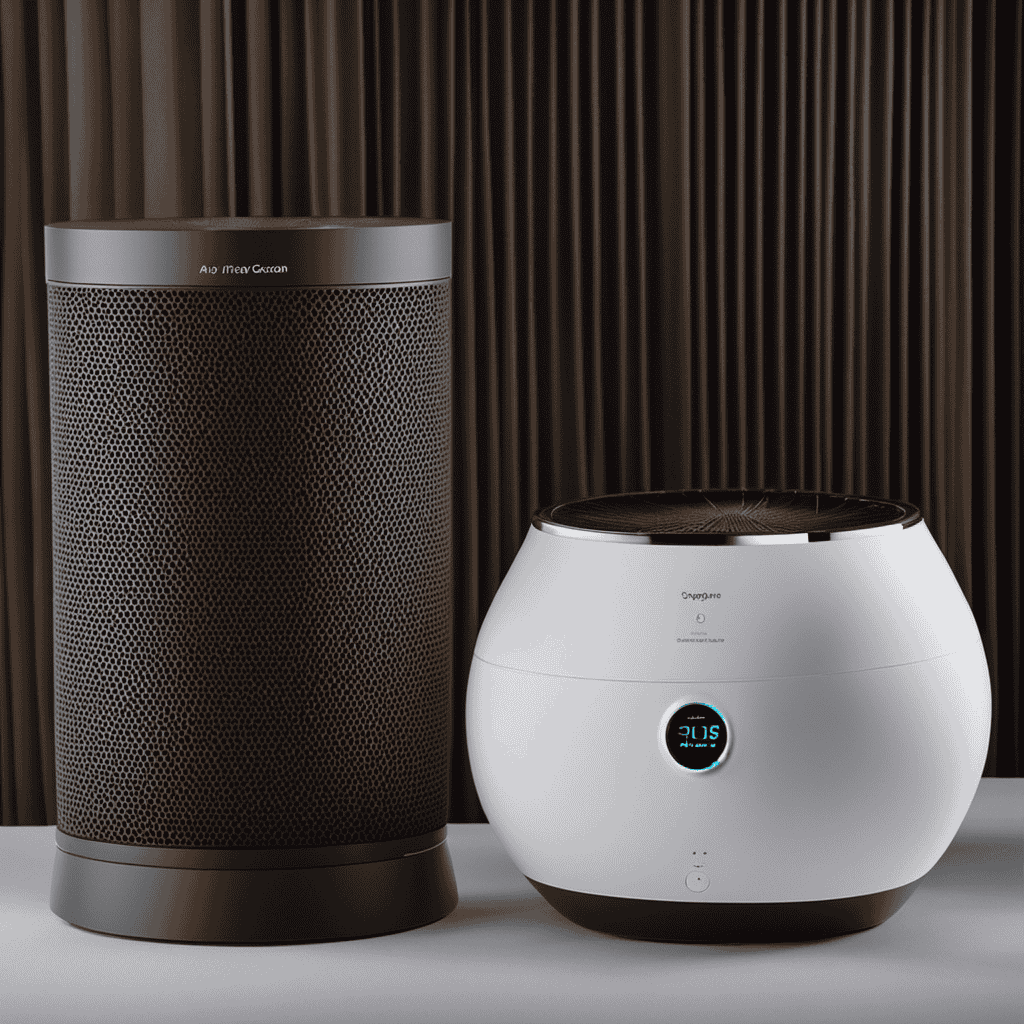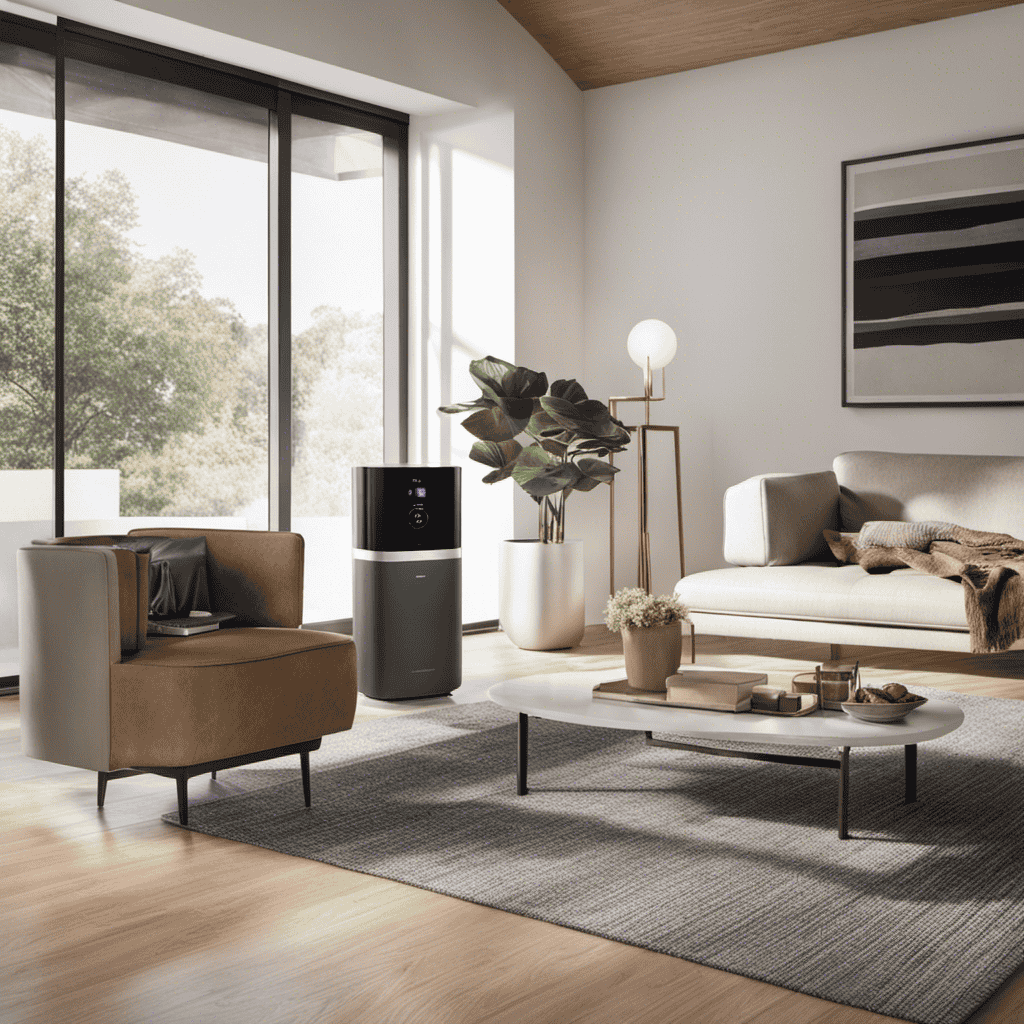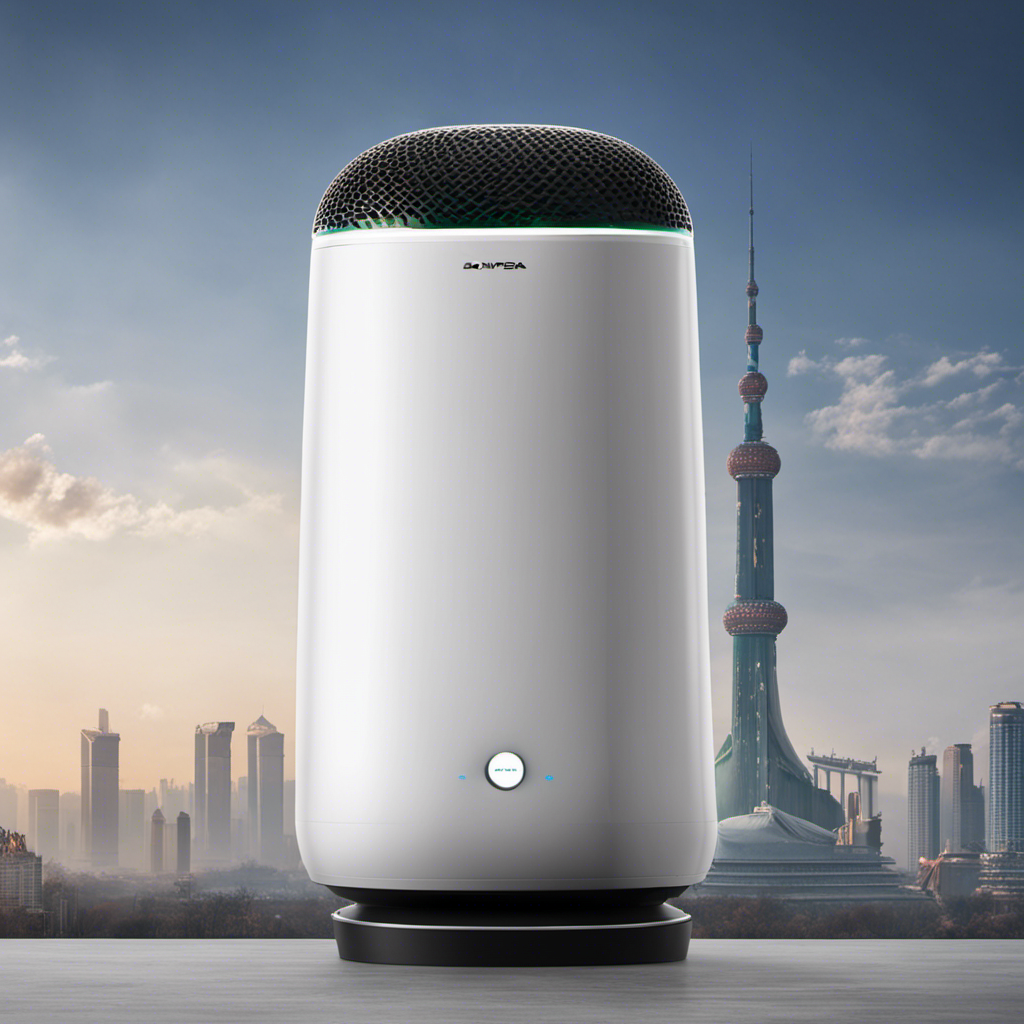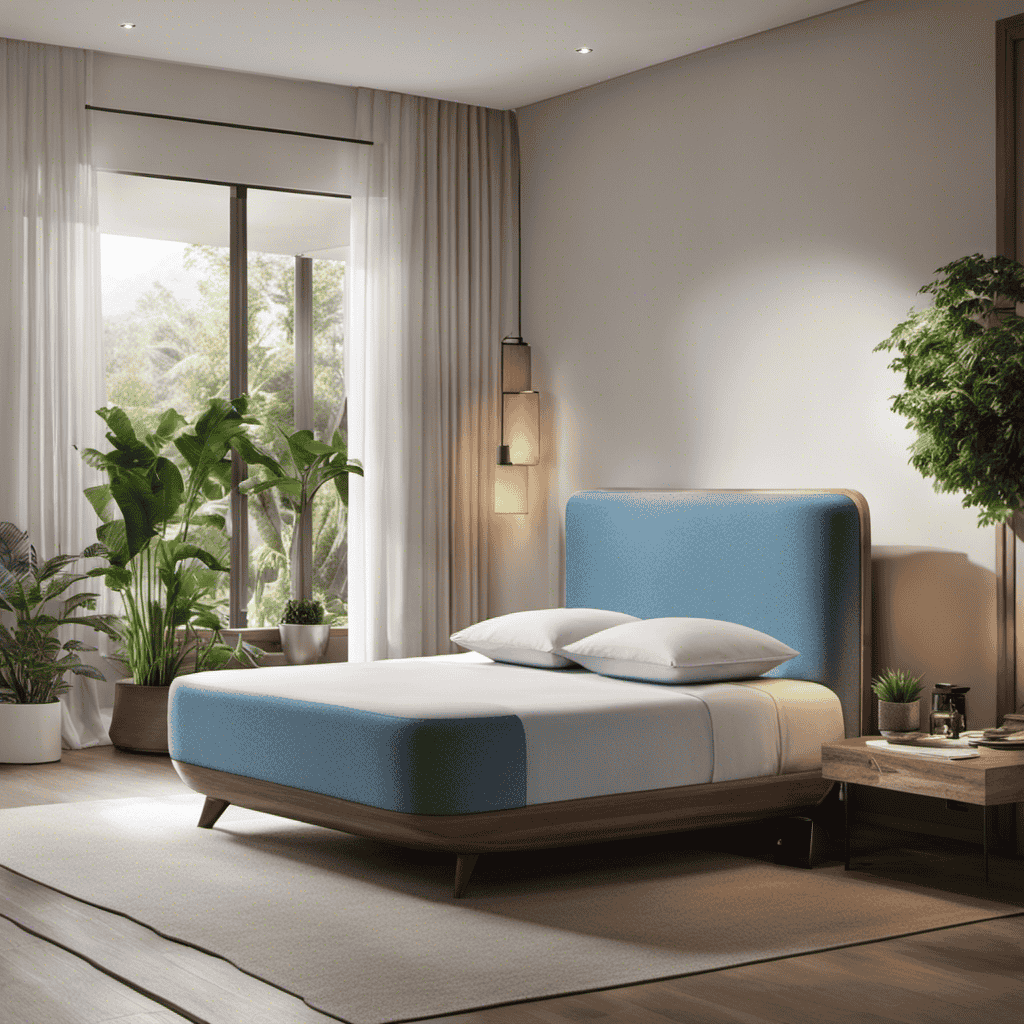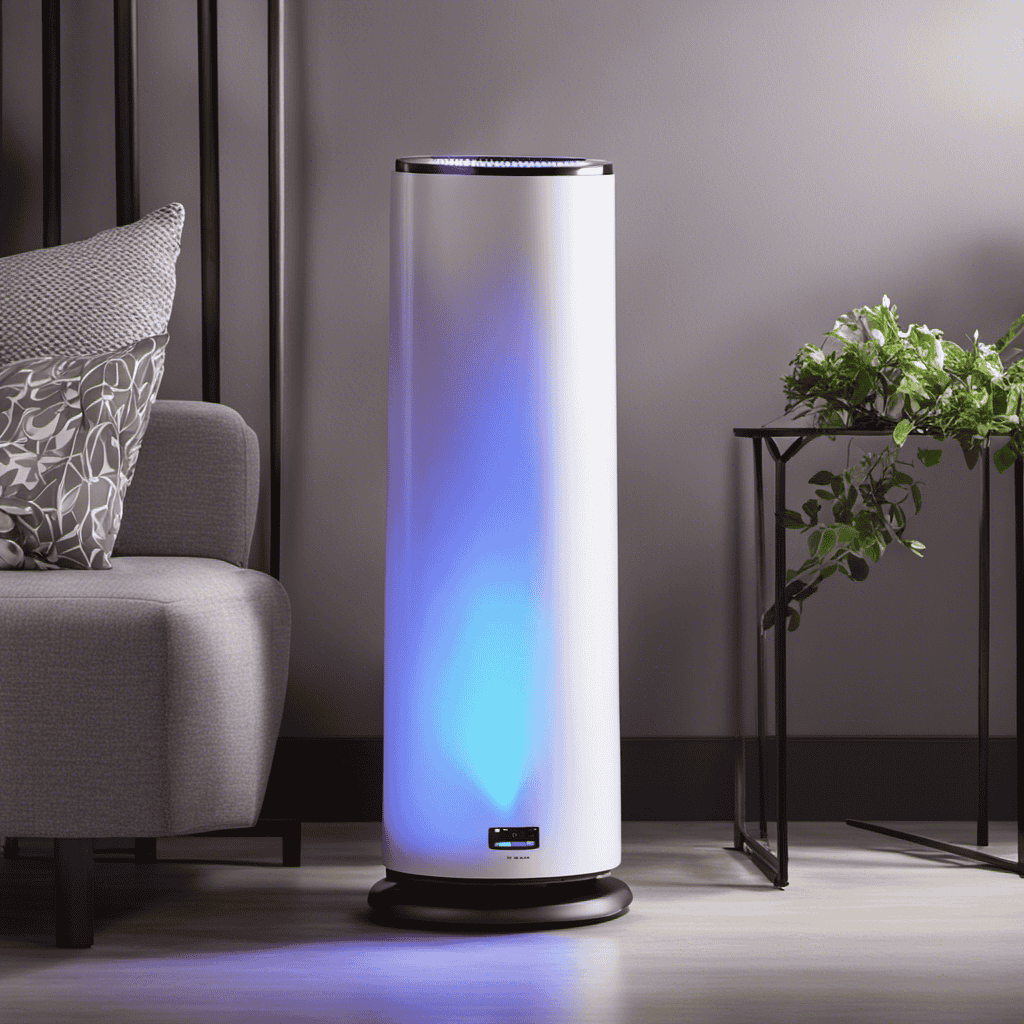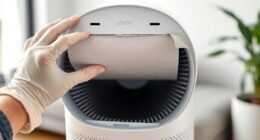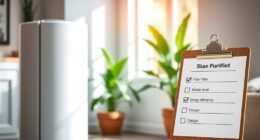Were you aware that the air inside can be as much as five times more contaminated than the air outside? This is the reason why it’s crucial to have a high-quality air purifier equipped with a carbon filter.
In this article, I will explain how a carbon filter works in an air purifier, the different types of carbon filters used, and the benefits they provide.
We will also explore factors to consider when choosing a carbon filter and the common contaminants they can remove, such as odors, volatile organic compounds (VOCs), and smoke.
Plus, we’ll compare carbon filters to HEPA filters to determine which is better for air purification.
So, let’s dive into the world of carbon filters and discover how they can improve our indoor air quality.
Key Takeaways
- Carbon filters in air purifiers trap and remove odors, chemicals, and volatile organic compounds (VOCs) from the air.
- There are two main types of carbon filters used in air purifiers: activated carbon filters and impregnated carbon filters.
- Impregnated carbon filters are often preferred due to their enhanced adsorption capacity and ability to neutralize specific pollutants like formaldehyde and ammonia.
- Carbon filters play a crucial role in improving indoor air quality by removing a wide range of contaminants and reducing the risk of respiratory issues.
How Does a Carbon Filter Work in an Air Purifier
A carbon filter in an air purifier works by trapping and removing odors, chemicals, and volatile organic compounds (VOCs) from the air.
Carbon, in the form of activated charcoal, is highly effective at adsorbing these contaminants due to its large surface area and porous structure.
When air passes through the filter, the carbon molecules attract and bind to the odor molecules, chemicals, and VOCs, effectively removing them from the air.
This process, known as adsorption, ensures that the air released by the purifier is cleaner and free from these harmful substances.
The effectiveness of carbon filtration in air purifiers cannot be overstated. It plays a crucial role in improving indoor air quality and creating a healthier living environment.
Without carbon filters, air purifiers would not be as effective at eliminating odors and reducing the presence of harmful chemicals and VOCs in the air we breathe.
Types of Carbon Filters Used in Air Purifiers
When it comes to carbon filters used in air purifiers, there are two main types to consider: activated carbon and impregnated carbon.
Activated carbon filters are made from carbon that has been treated to increase its surface area, allowing it to effectively trap and remove a wide range of pollutants from the air.
On the other hand, impregnated carbon filters are infused with additional substances, such as potassium permanganate or zeolite, to enhance their ability to target specific contaminants.
Both types of carbon filters offer numerous benefits, including the removal of odors, chemicals, and volatile organic compounds (VOCs) from the air.
However, it is important to keep in mind that carbon filters have a finite lifespan and will eventually need to be replaced to maintain optimal air purification performance.
Activated Vs. Impregnated Carbon
Impregnated carbon is often preferred over activated carbon in air purifiers for several reasons:
-
Surface Area: Activated carbon has a high surface area, allowing it to adsorb a wide range of contaminants. However, impregnated carbon takes this a step further with additional chemical treatments that enhance its adsorption capacity.
-
Filter Efficiency: While both activated and impregnated carbon filters are effective at removing odors, impregnated carbon excels in neutralizing specific pollutants like formaldehyde, ammonia, and volatile organic compounds (VOCs). This makes it particularly beneficial for individuals with chemical sensitivities.
-
Longevity: Activated carbon filters require regular replacement to maintain their efficiency. In contrast, impregnated carbon filters have a longer lifespan due to their enhanced adsorption capacity, reducing the need for frequent replacements.
-
Cost-effectiveness: Although impregnated carbon filters may have a higher upfront cost, their extended lifespan and specialized pollutant removal capabilities make them a cost-effective choice in the long run.
With its superior adsorption capabilities and targeted pollutant removal, impregnated carbon offers enhanced air purification performance compared to activated carbon filters.
Now, let’s explore the benefits of carbon filters in more detail.
Benefits of Carbon Filters
One advantage of using carbon filters is their ability to remove a wide range of contaminants from the surrounding environment. Carbon filters are highly effective in trapping and removing various pollutants, such as volatile organic compounds (VOCs), odors, gases, and chemicals.
The porous structure of activated carbon allows it to adsorb these contaminants, effectively purifying the air. This makes carbon filters an excellent choice for improving indoor air quality and reducing the risk of respiratory issues caused by poor air.
Additionally, carbon filters can help eliminate unpleasant smells, making the environment more pleasant and inviting. The effectiveness of carbon filters in removing contaminants depends on factors such as the quality of the carbon, the size of the filter, and the flow rate of air passing through it.
Therefore, it’s essential to choose high-quality carbon filters for optimal performance and maximum benefits.
Lifespan and Replacement
The lifespan of carbon filters can vary depending on factors such as usage, air quality, and maintenance. Carbon filter effectiveness can be affected by these factors, leading to a shorter lifespan and reduced air purification capabilities.
To understand the factors affecting carbon filter lifespan, consider the following:
-
Usage: The more frequently the air purifier is used, the quicker the carbon filter will become saturated and lose its effectiveness.
-
Air quality: If the air being filtered contains high levels of pollutants or odors, the carbon filter will have to work harder and may need to be replaced more often.
-
Maintenance: Regular cleaning and replacement of pre-filters can help extend the lifespan of carbon filters by preventing them from becoming clogged or overloaded.
-
Filter quality: The quality of the carbon filter itself can also impact its lifespan, with higher-quality filters lasting longer and providing better air purification.
Benefits of Using a Carbon Filter in an Air Purifier
You can experience several benefits when using a carbon filter in your air purifier. Carbon filters are highly effective in removing odors, gases, and volatile organic compounds (VOCs) from the air. The porous nature of activated carbon allows it to trap and absorb these pollutants, leaving your indoor air clean and fresh.
Not only does a carbon filter improve the air quality, but it also enhances the overall effectiveness of your air purifier by extending the lifespan of other filters. This cost efficiency makes carbon filters a popular choice among homeowners.
However, when choosing a carbon filter for your air purifier, there are several factors to consider. These include the size of the filter, the type of activated carbon used, and the specific pollutants you want to target.
Factors to Consider When Choosing a Carbon Filter for an Air Purifier
When choosing a carbon filter for an air purifier, there are several important factors to consider.
First, filter size and compatibility are essential to ensure that the filter fits properly in the air purifier and effectively filters the air.
Second, the carbon filter lifespan is crucial as it determines how often you’ll need to replace the filter to maintain optimal performance.
Lastly, the ability of the carbon filter to remove odors and chemicals is a key consideration for those looking to improve indoor air quality.
Filter Size and Compatibility
Filter size and compatibility can greatly impact the overall effectiveness of an air purifier. When it comes to choosing the right filter for your air purifier, there are several factors to consider. Here are four key points to keep in mind:
-
Filter size: The size of the filter determines how much air it can effectively purify. A larger filter can handle more air volume, resulting in better purification performance.
-
Compatibility: It is crucial to ensure that the filter is compatible with your specific air purifier model. Using an incompatible filter can lead to poor filtration and reduced effectiveness.
-
Effectiveness: The filter size and compatibility directly affect the overall effectiveness of the air purifier. A properly sized and compatible filter will efficiently capture and remove pollutants from the air.
-
Replacement cost and filter maintenance: Consider the cost of replacing the filters and the frequency of filter changes. It is important to choose a filter that strikes a balance between effectiveness and long-term maintenance costs.
Considering these factors will help you select the right filter for your air purifier, ensuring optimal performance and cost-efficiency.
Speaking of maintenance, let’s now dive into the next section about the lifespan of carbon filters.
Carbon Filter Lifespan
The lifespan of carbon filters can vary depending on usage and environmental conditions. Carbon filters are widely used in air purifiers to remove harmful gases, odors, and volatile organic compounds (VOCs) from the air. However, their effectiveness and longevity are influenced by several factors.
One of the key factors affecting carbon filter lifespan is the concentration of pollutants in the air. Higher levels of pollutants will result in faster saturation of the filter, reducing its effectiveness and lifespan. Another important factor is the airflow rate through the filter. If the airflow is too high, the filter may not have sufficient contact time with the pollutants, leading to reduced efficiency and shorter lifespan.
Environmental conditions such as temperature and humidity also play a role in carbon filter effectiveness and lifespan. Higher temperatures can accelerate the breakdown of the carbon material, while high humidity can promote the growth of mold and bacteria on the filter surface.
To better understand the factors affecting carbon filter lifespan, refer to the table below:
| Factors | Impact on Lifespan |
|---|---|
| Pollutant concentration | Reduced |
| Airflow rate | Reduced |
| Temperature | Reduced |
| Humidity | Reduced |
| Filter maintenance | Increased |
Odor and Chemical Removal
Odors and chemicals can be effectively removed from the environment using carbon filters. Carbon filter effectiveness is a key factor in choosing the best air purifiers with carbon filters.
Here are four reasons why carbon filters are highly effective in eliminating odors and chemicals:
-
Adsorption: Carbon filters have a large surface area that can trap and hold odorous molecules and volatile organic compounds (VOCs).
-
Chemical reactions: Certain odors and chemicals can undergo chemical reactions with the carbon surface, breaking them down into harmless substances.
-
Versatility: Carbon filters can remove a wide range of odors and chemicals, including smoke, pet odors, cooking smells, and formaldehyde.
-
Long-lasting: Carbon filters can maintain their effectiveness for an extended period, ensuring continuous odor and chemical removal.
By removing odors and chemicals, carbon filters create a healthier and more pleasant indoor environment.
Now, let’s explore the common contaminants that carbon filters can remove in air purifiers.
Common Contaminants Removed by Carbon Filters in Air Purifiers
Carbon filters in air purifiers effectively remove common contaminants, such as volatile organic compounds (VOCs) and smoke particles. The effectiveness of a carbon filter in an air purifier plays a crucial role in the overall performance of the device.
Carbon filters are designed to trap and eliminate harmful pollutants from the air by utilizing activated carbon, which has a porous structure that adsorbs the contaminants. The activated carbon acts as a sponge, attracting and trapping the VOCs and smoke particles, preventing them from being released back into the air. This ensures that the air you breathe is cleaner and healthier.
The efficiency of a carbon filter is determined by its surface area and the amount of activated carbon used. A larger surface area and a higher amount of activated carbon result in better filtration and improved air purifier performance. Therefore, it is important to choose an air purifier with a carbon filter that is effective in removing common contaminants for optimal performance.
How Long Does a Carbon Filter Last in an Air Purifier
In this discussion, I will explore the lifespan of a carbon filter in an air purifier and the frequency at which it needs to be replaced.
Carbon filters are a crucial component in air purifiers as they effectively remove common contaminants. However, it is important to understand how long these filters can last and the factors that influence their replacement frequency, in order to maintain optimal air quality in our living spaces.
Carbon Filter Lifespan
The lifespan of a carbon filter in an air purifier depends on how frequently it is used and the quality of the air it is filtering. Carbon filters are designed to trap and remove harmful pollutants and odors from the air, making them an essential component in air purification systems. The effectiveness of a carbon filter is determined by its ability to adsorb and retain pollutants.
Here is a breakdown of the factors that influence the lifespan of a carbon filter:
-
Usage: The more frequently an air purifier is used, the quicker the carbon filter will become saturated and need replacement.
-
Air quality: If the air being filtered contains high levels of pollutants, the carbon filter will have to work harder and may need replacement sooner.
-
Filter size: The larger the carbon filter, the longer it will last before needing replacement.
-
Maintenance: Regular cleaning and maintenance can help extend the lifespan of a carbon filter.
Carbon filter technology continues to evolve, with advancements in materials and design improving the effectiveness and longevity of these filters. Understanding the factors that impact their lifespan can help users maintain optimal air quality in their homes or workplaces.
Replacement Frequency Required
To ensure your air stays clean and fresh, you’ll need to replace the filter more frequently if you use it often or if the air quality is poor. Filter replacement is an essential part of maintaining the effectiveness of your air purifier.
Over time, the carbon filter in your air purifier becomes saturated with pollutants and loses its ability to efficiently trap them. As a result, it is important to follow the manufacturer’s guidelines for filter replacement. Generally, carbon filters should be replaced every 6 to 12 months, depending on usage and air quality. However, if you live in an area with high pollution levels or if you use your air purifier frequently, you may need to replace the filter more often.
Regular filter replacement is crucial to ensure optimal performance and to keep your indoor air clean and healthy.
Proper Maintenance and Replacement of Carbon Filters in Air Purifiers
Make sure you regularly check and replace the carbon filters in your air purifier to ensure its proper maintenance. Carbon filter maintenance is crucial for the optimal functioning of your air purifier and to ensure clean and healthy air in your living space.
Here are four important points to keep in mind:
-
Check the manufacturer’s guidelines: Different air purifiers have different recommendations for carbon filter replacement frequency. Follow the guidelines provided by the manufacturer to ensure the best performance.
-
Visual inspection: Regularly inspect the carbon filter for any signs of discoloration, dirt, or damage. If you notice any of these, it is time to replace the filter.
-
Filter lifespan: Carbon filters have a limited lifespan, typically ranging from 3 to 6 months. Replace the filter accordingly to maintain the effectiveness of your air purifier.
-
Environmental factors: If you live in an area with high pollution levels or have pets, you may need to replace the carbon filter more frequently.
By regularly maintaining and replacing the carbon filters in your air purifier, you can ensure that it continues to effectively remove pollutants and provide you with clean, fresh air.
Now, let’s explore whether carbon filters can remove odors in an air purifier.
Can Carbon Filters Remove Odors in an Air Purifier
After discussing the importance of proper maintenance and replacement of carbon filters in air purifiers, let’s now delve into the effectiveness of carbon filters in removing odors.
Carbon filters are highly efficient at eliminating unwanted odors from the air. This is due to the unique properties of activated carbon, which has a large surface area with countless tiny pores that can trap and adsorb odor-causing molecules.
As air passes through the carbon filter, the odorous compounds are attracted to the carbon surface and become trapped. This results in cleaner and fresher air, free from unpleasant smells.
The benefits of using carbon filters in air purifiers extend beyond odor removal. They also excel at capturing various volatile organic compounds (VOCs), gases, and chemicals, making them a valuable tool in maintaining indoor air quality.
Can Carbon Filters Remove Volatile Organic Compounds (VOCs) in an Air Purifier
You’ll be pleased to know that activated carbon efficiently eliminates volatile organic compounds (VOCs) from the air in an air purifier. The carbon filter’s effectiveness against VOCs is due to its unique properties and structure. Here are four reasons why carbon filters are highly efficient in removing VOCs:
- Large surface area: The activated carbon has a vast network of pores, providing a larger surface area for VOCs to adsorb onto.
- Adsorption capacity: The carbon’s porous structure allows it to adsorb VOC molecules, trapping them within its pores.
- Chemical bonding: The carbon’s surface interacts with VOCs, forming chemical bonds that effectively remove them from the air.
- Long-lasting efficiency: Carbon filters can maintain their effectiveness for an extended period, continuously removing VOCs from the air.
With these impressive capabilities, carbon filters are not only efficient but also reliable in eliminating VOCs from indoor air.
Transitioning to the next section, let’s explore whether carbon filters can also remove smoke in an air purifier.
Can Carbon Filters Remove Smoke in an Air Purifier
In the previous subtopic, I discussed the effectiveness of carbon filters in removing volatile organic compounds (VOCs) in air purifiers. Now, let’s delve into whether carbon filters can effectively remove smoke particles from the air.
When it comes to removing smoke, carbon filters are highly effective. Smoke particles are small and can easily enter our respiratory system, posing potential health risks. Inhaling smoke particles can lead to respiratory issues and even lung damage.
Carbon filters work by adsorbing smoke particles onto their activated carbon surfaces. The activated carbon has a high surface area, allowing it to trap and hold onto smoke particles effectively. In comparison, electrostatic filters may not be as efficient in removing smoke particles.
Therefore, if you are looking to reduce your exposure to smoke particles, opting for an air purifier with a carbon filter is recommended. It will help improve indoor air quality and protect your respiratory health.
Carbon Filters Vs. HEPA Filters: Which Is Better for Air Purification?
When comparing carbon filters and HEPA filters for air purification, it’s important to consider their respective strengths and limitations. Here is a comparison of the two:
-
Carbon filters: These filters are highly effective at removing odors, chemicals, and volatile organic compounds (VOCs) from the air. They work by adsorbing these contaminants onto the carbon surface. However, carbon filters are not as efficient in removing particulate matter like dust, pollen, and pet dander.
-
HEPA filters: These filters excel at removing particulate matter, capturing 99.97% of particles as small as 0.3 microns. They are highly effective in trapping allergens and pollutants. However, HEPA filters do not remove odors or chemicals from the air.
Frequently Asked Questions
Can Carbon Filters Remove Pet Dander and Allergens in an Air Purifier?
Yes, carbon filters in air purifiers can remove pet dander and allergens. They are effective at trapping and absorbing airborne particles, including pet hair and other allergens, improving indoor air quality.
Are Carbon Filters Washable and Reusable?
Yes, carbon filters are washable and reusable. However, it’s important to note that over time, their effectiveness may diminish. Regular carbon filter maintenance ensures optimal performance in removing pet dander and allergens.
Can Carbon Filters Remove Mold Spores in an Air Purifier?
Yes, carbon filters in air purifiers can effectively remove mold spores. They work by adsorbing the mold spores onto the surface of the activated carbon, trapping them and preventing them from circulating in the air.
Can Carbon Filters Eliminate Cooking Smells and Kitchen Odors?
Yes, carbon filters in air purifiers can effectively eliminate cooking smells and kitchen odors. They are also highly effective in removing cigarette smoke and its associated odor.
Do Carbon Filters Remove Bacteria and Viruses in an Air Purifier?
Yes, carbon filters in air purifiers can remove bacteria and viruses. Unlike HEPA filters, carbon filters use activated carbon to adsorb these contaminants. It is important to replace carbon filters regularly to ensure optimal performance.
Can an Air Purifier Have Both Hepa and Carbon Filters?
Yes, an air purifier can have both HEPA and carbon filters. HEPA filters are effective at removing small particles like dust and pollen, while carbon filters are great for removing odors and chemicals. Together, they provide comprehensive air purification. HEPA and carbon filters explained.
Conclusion
In conclusion, I’m convinced that the carbon filter in air purifiers is a true marvel of technology. This powerful filter eliminates common contaminants and has the incredible ability to remove odors, volatile organic compounds, and even smoke from the air. Its efficiency surpasses that of HEPA filters, making it the ultimate choice for air purification.
With a carbon filter, you can breathe in air so pure and fresh that it feels like you’re standing on a mountaintop surrounded by pristine nature.
